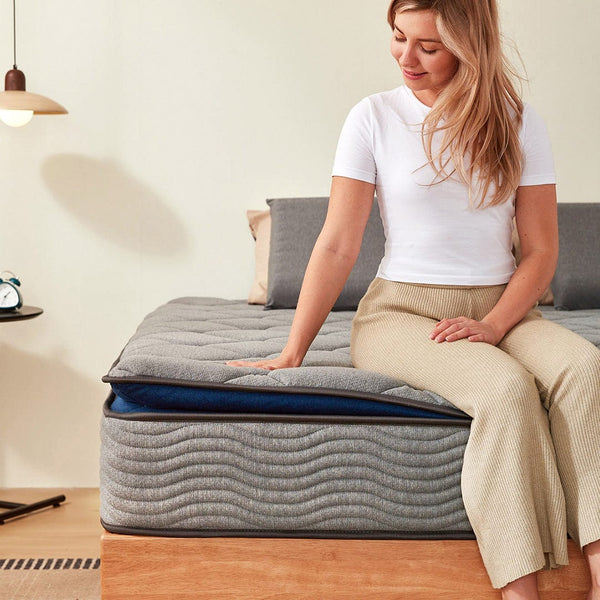Most mattresses typically last between 3 to 5 years, but this can vary significantly depending on the type of mattress, its core materials, and the quality of construction. A well-made mattress that’s properly cared for can even last up to 8–10 years or more. So, what kind of mattress lasts the longest? Let’s explore the main types and see which one offers the best durability.
How Many Years Should a Mattress Last [Expert Tips]
In general, a mattress has a lifespan of about 3 to 5 years. Beyond this period, it may begin to sag, sink, or develop uneven surfaces—leading to back pain, morning stiffness, and poor sleep quality. However, choosing a high-quality mattress and maintaining it properly can potentially double its lifespan. This not only supports better sleep health but also saves you money on replacements in the long run.
This guide will walk you through the key factors that affect your mattress's longevity, the average lifespans of different mattress types, and some practical care tips. By the end, you’ll be able to determine whether it’s time to replace your mattress and make a more informed decision.

In this article
How Many Years Should a Mattress Last?
1. Innerspring Mattress
Materials: Innerspring mattresses are made with a support core of interconnected or individually wrapped steel coils, topped with a relatively thin comfort layer made from materials like cotton, foam, or fiberfill.
Average Lifespan: 3–5 years
Best for short-term use or guest rooms where longevity isn’t a top priority.
Pros
- Affordability: One of the most budget-friendly mattress types.
- Responsiveness: Offers a bouncy, springy feel that makes movement easy.
- Airflow: The open coil structure promotes airflow, helping to keep the mattress cool.
Cons
- Sagging: Coils can wear out over time, leading to dips and uneven support.
- Limited Pressure Relief: The thin comfort layer often doesn’t contour well to the body, which may cause pressure points.
- Poor Motion Isolation: Movement from one side of the bed is easily felt on the other, making it less ideal for couples.
2. Memory Foam Mattress
Materials: Made entirely or mostly from high-density polyurethane foam, memory foam mattresses are known for their body-contouring capabilities. Some versions include gel or other materials to enhance cooling.
Average Lifespan: 4–7 years
Ideal for people who prioritize pressure relief and don’t mind a “hugging” sleep surface.
Pros
- Pressure Relief: Molds to the shape of your body, supporting joints and relieving pressure points.
- Good for Side Sleepers: Conforms to hips and shoulders, promoting spinal alignment.
- Low Motion Transfer: Excellent for couples—movement on one side is rarely felt on the other.
Cons
- Potential Sagging: Over time, the foam may lose resilience, especially in lower-quality models.
- Off-gassing: New memory foam mattresses may emit a slight chemical odor initially.
3. Hybrid Mattress (Best Overall Choice)
Materials: Hybrid mattresses combine pocket springs with multiple layers of foam or latex on top—often including memory foam, latex, or cooling gel-infused foam. This structure blends support, comfort, and durability.
Average Lifespan: 8–10+ years
Best suited for sleepers who want premium support, lasting durability, and enhanced comfort—highly recommended for daily long-term use.
Pros
- Balanced Comfort and Support: Offers the contouring of foam with the strong, springy support of coils.
- Breathability: The coil system enhances airflow, reducing heat buildup compared to pure foam beds.
- Great Motion Isolation: Pocket coils move independently, reducing motion transfer.
- Durability: High-quality hybrid mattresses hold their shape well over time and resist sagging.
Cons
- Typically more expensive due to the advanced construction and materials.
However, the quality of hybrid mattresses on the market can vary widely, and researching different brands often takes a great deal of time and effort. But don’t worry—we’ve done the hard work for you. After testing a wide range of hybrid mattresses and analyzing feedback from over 500,000 users, we’ve continuously refined and improved our Hybrid Mattress Pro. It offers not only exceptional craftsmanship but also cloud-like comfort, earning consistent praise from various media outlets.
See What Bedbuyer say about Newentor Mattress>>
Want to know the differences between Newentor Hybrid Mattress pro and other hybrid mattress, don't miss this article>>
Newentor Hybrid Mattress Pro

When Should You Replace a New Mattress?
Knowing when to replace your mattress is essential for maintaining healthy sleep and spinal support. While most mattresses last between 3 to 5 years depending on their type and quality, there are several clear signs that it might be time for a new one:
- Morning Aches and Pains: If you wake up with back, neck, or shoulder pain, your mattress may no longer be providing adequate support.
- Visible Sagging or Uneven Surface: Over time, mattresses can develop dips or lumps that affect sleep quality and spinal alignment.
- Noticeable Wear and Tear: Ripped fabric, exposed coils, or general structural damage are indicators your mattress is past its prime.
- Persistent Stains or Odors: Mattresses can absorb moisture and body oils over the years. If there are stains or smells that don’t go away with cleaning, replacement is a good idea.
- Presence of Bed Bugs or Allergens: If your mattress has bed bugs, dust mites, or causes frequent allergy flare-ups, it’s both a health and hygiene concern.
If you're experiencing the warning signs mentioned above but still hesitate to part with your old, sagging mattress, a mattress topper can be a quick and budget-friendly solution. However, if your mattress has already exceeded its average lifespan (typically 3 to 5 years), the benefits of a topper may be limited. In this case, it might be time to consider investing in a new mattress to ensure you're getting the quality sleep your body needs.
Want to Know what is a mattress topper? Watch this article>> Learn about Mattress Toppers
Factors Influencing the Lifespan of Your Mattress
The lifespan of a mattress isn't fixed—it depends on several key factors that determine how well it holds up over time:
1. Materials and Mattress Type:
Different materials wear differently. For example, hybrid mattresses have the longest lifespan, typically lasting 8 to 10 years. Next are memory foam mattresses, which generally last around 4 to 7 years, although high-quality memory foam models can also reach 8 to 10 years with proper care. In contrast, innerspring mattresses usually have the shortest lifespan, lasting only 3 to 5 years.
2. Body Weight and Sleeping Position:
Heavier individuals or couples place more pressure on a mattress, which can lead to faster sagging and wear. Similarly, side sleepers may wear down the comfort layers faster due to concentrated pressure on hips and shoulders.
3. Construction Quality:
Mattresses made with high-quality craftsmanship—such as reinforced edges, dense foams, and individually wrapped coils—tend to maintain their shape and support longer than cheaper alternatives. Here's how to judge the build quality across different mattress types:
- Innerspring Mattresses:
Look for models with individually pocketed coils rather than interconnected springs. Pocketed coils offer better support and motion isolation. A coil count above 600 for a queen-size mattress is a good sign of durability. Reinforced edge support is also important to prevent collapse around the perimeter. - Memory Foam Mattresses:
High-quality memory foam mattresses use high-density foam (at least 1.8–2.2 lbs/ft³) in the base layer and responsive, slow-recovery foam in the comfort layer. Multiple foam layers with seamless transitions and proper ventilation (like gel or open-cell foams) also indicate better quality and longevity. - Hybrid Mattresses:
The best hybrids combine thick, pressure-relieving foam layers with individually pocketed springs, often zoned for ergonomic support. Look for 3cm micro coils to replace transition layers can prevent sinking effectively. A hybrid mattress with multi-layer construction and breathable fabric covers often reflects superior engineering.
Care and Cleaning:
Regularly rotating your mattress (learn how often to rotate your mattress), using a mattress protector, and keeping it clean (discover tips for cleaning your mattress) from moisture and dust can significantly extend its lifespan. Poor maintenance, on the other hand, accelerates deterioration.
By understanding and managing these factors, you can protect your investment and enjoy comfortable, restorative sleep for years to come.
FAQs about Mattress Lifespan
What type of mattress lasts the longest?
Hybrid mattresses have the longest lifespan, typically lasting 8 to 10+ years. They represent a revolutionary innovation in traditional mattress design and have quickly become the top choice for many consumers when purchasing a new mattress.
Is 20 years too old for a mattress?
Yes, 20 years is far beyond the recommended lifespan for almost any mattress type. Even the most durable mattresses rarely maintain proper support and hygiene for that long. An old mattress can harbor allergens, sag deeply, and negatively affect your sleep and spinal health. It’s highly recommended to replace it.
Should I replace my mattress or get a mattress topper to extend the mattress lifespan?
A mattress topper can offer temporary comfort if your mattress is less than 5 years old and still structurally sound. However, if your mattress is sagging, uneven, or has surpassed its average lifespan, a topper will only mask the issue. In that case, it's better to replace the mattress to ensure proper support and sleep quality.
Botton Lines
We hope this guide has been helpful in understanding how long will a mattress last and how to recognize when it’s time for a replacement. If your mattress is sagging, causing discomfort, or showing signs of age, it’s likely no longer supporting your sleep health the way it should.
Investing in a high-quality mattress—especially a well-constructed hybrid mattress—can make a significant difference in your sleep quality, physical well-being, and overall energy levels. Don’t wait until poor sleep takes a toll on your daily life. A better night’s rest starts with the right foundation.
If you're ready to upgrade, the Newentor Hybrid Mattress pro offers durability, comfort, and exceptional value—all backed by real user feedback and expert testing. Check it now!




















